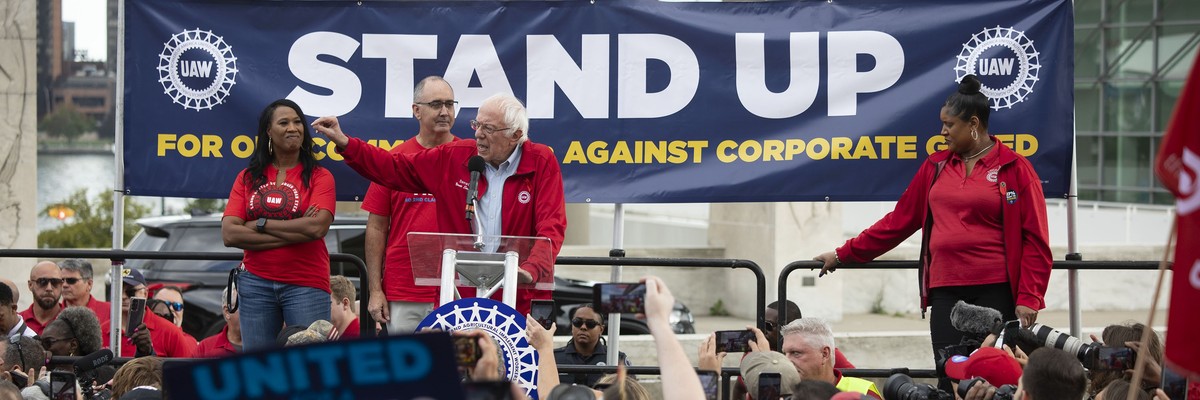Sen. Bernie Sanders used his remarks at a United Auto Workers rally in Detroit on Friday to send a message to the chief executives of the Big Three U.S. car manufacturers, which have thus far refused to meet the union's wage and benefit demands despite raking in huge profits over the past decade.
"It is time for you to end your greed," the Vermont senator said to cheers from the crowd gathered in downtown Detroit—home to the headquarters of General Motors—hours after more than 12,000 UAW members walked off the job in Michigan, Missouri, and Ohio, kicking off a historic strike that's likely to expand to more Big Three facilities as negotiations continue without a contract agreement.
Sanders (I-Vt.), one of organized labor's most vocal allies in Congress, called out each of the Big Three CEOs by name, highlighting their exorbitant compensation packages and asking whether they're aware of their employees' economic struggles.
"Do you have any clue what it's like for one of your workers to try to survive on $17 an hour, which is the average starting wage of an automobile worker?" Sanders asked, a question directed at General Motors CEO Mary Barra, who received around $29 million in total compensation last year.
"Do you know, Ms. Barra, what it's like to try to raise a family, put food on the table, and pay rent when you're making $20 an hour?" the senator asked, pointing out that Barra has pocketed more than $200 million in compensation since becoming General Motors' top executive in 2014.
Sanders proceeded to ask similar questions of the chief executives of Ford and Stellantis, who both made more than $20 million in 2022.
Addressing Stellantis CEO Carlos Tavares, Sanders said, "Do you know, Mr. Tavares, what it is like to be classified as a temp, and despite working year after year you remain a temp, receiving wages and benefits significantly lower than your brothers and sisters doing the same exact work?"
Turning his attention to Ford's Jim Farley, the senator noted that "last year you made more than $20 million in total compensation, and my guess is that when you retire from your job, you're gonna have a great pension, golden handshake, and all kinds of benefits."
"Do you have any clue as to what it's like to be a worker getting older, having worked your entire life, and not having any money in the bank as you prepare for retirement?" Sanders asked.
"Let's be clear that what the UAW is fighting for is not radical," Sanders continued, criticizing the corporate media for failing to put workers' demands in the context of massive corporate profits and major union sacrifices during the auto industry crisis more than a decade ago.
"Last year, these companies spent $9 billion not to improve the lives of their workers, but to pay for stock buybacks and dividends to make their wealthy stockholders even richer," Sanders said. "Meanwhile, while the CEOs and stockholders in the automobile industry made out like bandits, the workers who build the vehicles—you—are earning totally inadequate wages and, over the last several decades, have fallen further and further behind."
Sanders described the UAW's central demands—from a 36% wage increase to an end to tiered pay systems that leave newer workers far worse off—as "totally reasonable" compensation for the "record-breaking profits that their labor has produced."
"The CEOs of General Motors, Ford, and Stellantis and their major stockholders on Wall Street have got to understand: they cannot have it all," said Sanders. "We refuse to live in an oligarchy. We refuse to accept a society in which so few have so much and so many have so little."
